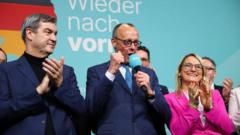As Friedrich Merz steps into his new role amidst a politically fragmented Germany, he must address both internal divisions and external expectations while navigating the complexities of coalition governance in the face of the growing influence of the far-right AfD.**
Navigating the Political Landscape: Friedrich Merz's Challenges Ahead**

Navigating the Political Landscape: Friedrich Merz's Challenges Ahead**
Germany's evolving political landscape poses significant challenges for Friedrich Merz, who must unite a divided nation while facing the rise of the AfD.**
Germany finds itself at a pivotal juncture as Friedrich Merz embarks on his journey in a landscape marked by sharp divisions. Recent elections underscored challenges that extend beyond economic revitalization and humanitarian reforms; they reflect the nation’s quest to assert its position on the global stage. While European allies look to Berlin for leadership, Merz faces the daunting task of harmonizing varying domestic priorities.
The election results revealed persistent socio-political divides within Germany. Data indicates a noticeable east-west schism, remnants of the historic divide that characterized the country until reunification. The far-right AfD is consolidating its influence in the former East, while the Christian Democratic Union (CDU) remains dominant in the southern and western regions. Notably, the 18-24 age demographic showed a preference for the leftist Die Linke party, alongside rising support for the AfD.
The AfD’s contentious rise, marked by controversy and inflammatory rhetoric, has become a focal point of the political discourse. Barred from governmental coalitions due to their far-right classification, the party has been increasingly vocal, with some members facing backlash for their extremist views and comments. The discourse surrounding the party has polarized opinions, with some supporters framing their advocacy as a defiance of mainstream politics, while critics warn of the potential normalization of extremist dialogues.
Looking ahead to the next election cycle in 2025, analysts speculate whether this moment signifies a peak for the AfD or a crucial step towards establishing a foothold in Germany’s government. A significant factor influencing this outcome will be the ability of centrist parties to effectively engage with and address voter concerns, potentially staving off AfD’s ascendancy.
As Merz steps into his role, he must contend with the legacy of outgoing Chancellor Olaf Scholz, who navigated the complexities of a coalition during turbulent times. The need for decisive action on pressing domestic and international issues remains critical for Merz as he strives to stabilize Germany's political climate. Failure to deliver significant outcomes could further jeopardize the centrist parties, amplifying the AfD as a formidable opposition force moving forward.





















